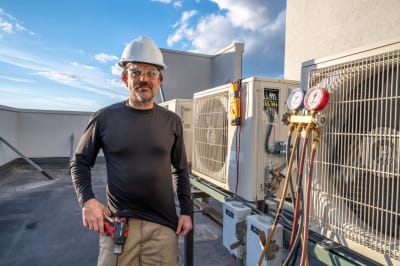Not all HVAC technicians in Cincinnati, Ohio, have college degrees. This is because an advanced degree is optional to start a career.
But also, this is not to say that a higher level of education is not required. As you’ll see below, there are several pathways to becoming an HVAC technician in Cincinnati, but rigorous training is still an absolute requirement.
To help you get familiar with the possible alternatives, we have provided a quick overview below regarding the general pathway involved in becoming an HVAC technician in Cincinnati.
Furthermore, we have also provided a comprehensive list containing the most prominent training programs in and around the city to enroll in for the best possible education.
How to Become an HVAC Technician in Cincinnati
Like in most cities in the country, aspiring HVAC technicians in Cincinnati need a high-school diploma or GED to secure admission into a training program.
They can then choose to enroll in a college or vocational school program to obtain a combination of classroom and hands-on training or simply go with an apprenticeship program lasting 3 to 5 years to obtain real-world training and mentorship.
Even after completing their training programs, future HVAC technicians in Cincinnati must be licensed by the state before they can do their jobs. License, once obtained, be renewed every two years.
Certification such as OSHA, EPA, and NATE credentials are also advisable and sometimes mandatory, depending on the nature of the job in question.
Top HVAC Technician Schools in Cincinnati, Ohio
Below are some of Cincinnati, Ohio’s most notable HVAC Technician Schools.
1. Fortis College
Fortis College is one of Ohio’s most popular destinations for aspiring HVAC technicians. The programs are structured to ensure graduates can enter directly into entry-level positions and work their way up with time and experience.
Students get to enjoy a great deal of classroom instruction along with coaching by experienced instructors in small groups. The program also pays attention to hands-on training, as they are several opportunities for students to hone their skills during lab sessions and workshops.
The Accrediting Commission of the Council on Occupational Education accredits Fortis College. Candidates are expected to go through personal interviews before they are admitted.
2. Southern Ohio Technical College
Southern Ohio Technical College is another veritable destination for aspiring HVAC technicians in Cincinnati. The program aims to produce students who are sound in both classroom topics and actual hands-on skills.
Unlike most other programs, the HVAC technician program at Southern Ohio Technical College tries as much as possible to produce only graduates who have already acquired real-world experience.
Another highlight of the program is that graduates often receive support in their search for employment, with the school leveraging its connections with HVAC contractors and companies all across the state.
Applicants must be at least 18 and have graduated from high school to secure admission.
3. University of Northwestern Ohio
At the University of Northwestern Ohio, students learn all the skills needed to work with any HVAC system. What separates the school from the pack is that unlike most colleges and technical school programs, the HVAC program at the University of Western Ohio focuses mainly on hands-on learning.
The program claims to be a 70% hands-on training school.
Students will learn about service and procedures, electrical and electronics, heat pump and controls, and air conditioning systems and controls.
Students may enroll for the diploma program, which includes 1078 total hours (971 technical and 107 general hours), or the associate degree program with 1331 total hours (984 technical and 347 general hours).
4. Great Oaks Institute of Technology
Accredited by the Commission on Accreditation of Rehabilitation Facilities, Great Oaks Institute of Technology prides itself as one of the best destinations to learn the fundamentals of HVAC technology.
Students learn how to repair, troubleshoot l, and install a wide range of HVAC systems and are usually ready to take on real-world jobs once they graduate from the program. They will have to fulfill 900 hours of training to graduate, including classes every Monday to Thursday evening.
There may be additional classes on Fridays as well.





